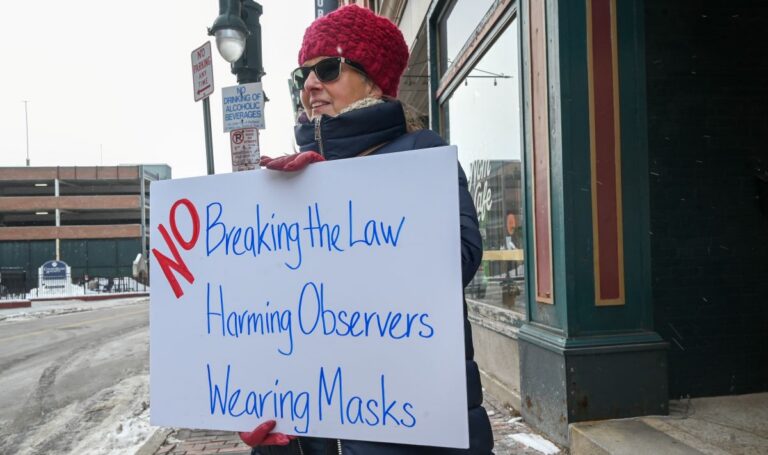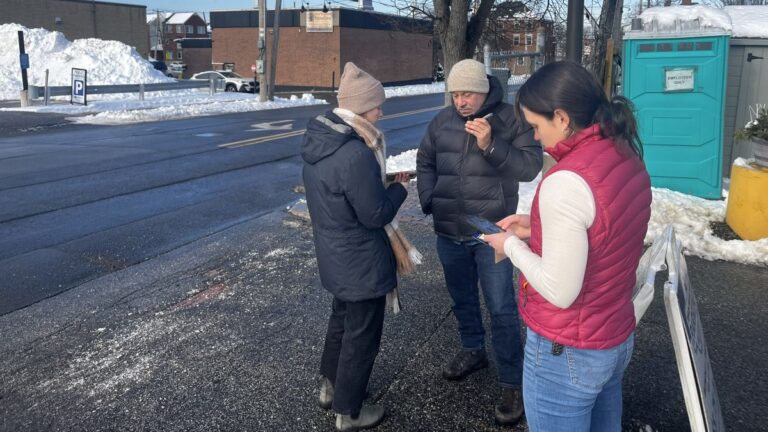MACHIAS — Washington County commissioners are giving municipalities the option to pay their share of the county’s $8 million tax anticipation note by the end of the year to help with cash flow after years of financial mismanagement left the county in a multi-million-dollar hole.
The county takes out a TAN to fund its operations for the first nine months of the year because the municipalities operate on a different budget cycle than the county does.
This year, the county does not have any money to pay the TAN by Dec. 31 and is asking voters to take out a bond to pay the TAN, while at the same time giving municipalities the option to pay their portion of the TAN early, which would reduce the overall value of the bond if approved.
Normally, the TAN and its interest would be paid indirectly by municipalities as part of the county tax assessment.
If a municipality decides to pay their share to the county, this would release them from any involvement in the potential up to $8 million bond, which is intended only to pay the TAN off by the end of the year.
On Tuesday, Nov. 4, Washington County will ask voters to pass a 10-year bond up to $11 million, although the county commissioners recently pledged in a vote to only draw enough to pay off the $7.6 million tax anticipation note that is due by Dec. 31 to Machias Savings Bank. With interest, the commissioners estimate a total of approximately $8 million.
The more municipalities that pay off their share of the TAN by the end of the year, the less the total bond will be.
“If some municipalities pay off their portion early, it would be less than $8 million that they could use,” Ben Edwards, vice chairperson of both the Machias Select Board and the Washington County Budget Advisory Committee, said during the Oct. 22 Machias Select Board meeting. “The vote is just to retire the TAN.”
Edwards explained how the county ran out of money without realizing it until late last year. A combination of COVID-era American Rescue Plan Act (ARPA) funds obfuscating cash flow shortages and a serious delay in receiving timely financial audits hid the problem for years.
The ARPA funds were nominally used for the construction of the new $6.5 million Washington County Sheriff’s Office building and covered holes in the county’s cash flow. When the bill came due, the county had to borrow more money to pay the contractors, Edwards said.
“We all know the county, through a series of accounting errors, has a large deficit,” Edwards said. “What we are facing right now is the county will run out of cash flow to run day-to-day operations in early February. We also have an $8 million tax anticipation note which comes due Dec. 31, of which we have no money to pay.”
At a conservative estimate of 5 percent interest per year on $8 million, the bond could ultimately cost taxpayers another $4 million in interest over the next 10 years, though the terms of the loan are not yet finalized.
Most towns and cities are taking a “wait-and-see” approach to deciding whether to pay their portion of the TAN off early, although Edwards said he feels that many will take advantage of the early payoff.
“The point of the bond is it allows each municipality to look at their own personal financial situation and make a decision that works best for them,” he said.
In addition to Machias, town officials from Cherryfield, Calais, Eastport, Baileyville, Columbia and Lubec said they are waiting to see which way the bond vote goes before making any decisions.
“My council understands the problem,” said Brian Schuth, Eastport city manager and a member of the Washington County Budget Advisory Committee. “I think they’re taking a wait-and-see attitude, seeing if the bond passes or not. Eastport is considering all possibilities.”
Baileyville Town Manager Chris Loughlin doesn’t see the early payoff as an option for Baileyville, noting that the decision would have to go to a special town meeting for voter approval.
“We’ve already taxed the public once,” he said. “I don’t think you could convince the folks that that’s the way to go.”
All of the towns mentioned above have indicated that to aid with the county’s financial shortfall, municipal budgets will likely have to be tightened in the coming years to attempt to offset the county’s anticipated year-over-year tax increases.
“We may have to start looking at, Can we carry the number of employees we have? Can we carry the amount of services that we do? That’s going to be the harder task come budget time,” Loughlin said.
The county tax assessment accounts for, on average, 10 percent of each municipality’s total budget, Edwards explained at the Oct. 22 Machias Select Board meeting. Therefore, the proposed 40 percent increase in next year’s county budget will not directly translate to a 40 percent increase in local property tax.
Edwards said residents can calculate what their particular tax bill increase will be given the proposed increase in Washington County funding on the county website.
Schuth, in Eastport, said that residents will have to be clear about what services they want to see cut at the local and county level if they want taxes to remain level, especially in the face of inflation and rising costs, not to mention the county’s financial hole caused by years of mismanagement.
Members of the Washington County Budget Advisory Committee are currently gathering feedback from municipalities to see what they want the county to do in this fiscal crisis.
“In the case of the county and every municipality, the question becomes, ‘If you want taxes to go down, you need to identify which services you want to get rid of,” Schuth said. “The county believes it’s running close to the bone, we’re running close to the bone.”
Calais Mayor Marcia Rogers said the city council has been sounding alarm bells about the budget since at least 2020, writing letters to the commissioners.
She noted that the city council is waiting to see if the bond passes, what the final county budget will be, and how much is in Calais’ undesignated fund balance, or surplus, to make any decisions.
“Once we have the numbers, then we’ll sit down and figure out what we’re doing moving forward,” Rogers said.
Edwards explained that most of the people now overseeing the county’s finances were not in their positions during the time that the mismanagement took place. All three county commissioners, the county manager and treasurer, and five of the 11 members of the budget advisory committee are new this year.
“This is basically a complete rework of the leadership at the county that is overseeing it,” Edwards said. “We’re not giving the money to the same people that created the problem.”
“It wasn’t stolen. It wasn’t embezzled. It was spent on county services. We are responsible for it. We have to pay it back,” he said of the tax anticipation note.
At that meeting, the Machias Select Board set a public hearing for 5 p.m. on Nov. 19 and a special town meeting at 5 p.m. on Dec. 3. Residents will gather information and then make the final decision about whether to pay off the town’s portion of Washington County’s note and how to access the funds — whether by borrowing at an anticipated lower interest rate than the county or taking the money from the town’s surplus fund.
“As we complete our audits, we may feel comfortable to say, ‘Let’s just pay it off sooner with our own surplus,’” Town Manager Sarah Craighead-Dedmon said. “Machias has the capacity to handle it no matter what happens — if the bond fails, if the bond passes.”
“It’s an unfortunate occurrence and certainly we have other dreams for that money,” she said. “I feel we do have a path forward. It will mean a tighter budget season in the coming year, and probably years, but it’s not going to stop anything.”
Machias’ share of the note, based on 2025 property valuations, is 3.93 percent, which totals an estimated $314,152. If the town paid this amount to the county, it would be exempt from having to pay back part of the proposed $8 million bond plus interest.
Edwards noted that rejecting the bond will only lead to greater expenses and “pain” for the county and its residents, as the county would simply have to add the $8 million owed to next year’s budget, forcing taxpayers to absorb the blow in one year.
“If we default on the $8 million … we have to pay the $8 million back no matter what,” he said. “I think it’s a very common misconception to think, ‘Well, we’re just not going to pass the bond, and we’re not going to pay the $8 million. That is absolutely not accurate.’”
However, if the bond does fail, Edwards said the county budget advisory committee does have a mechanism in place that could possibly allow it to obtain another tax anticipation note to pay off the current one and fund county operations for the first nine months of 2026.
The county commissioners are working on a plan to adjust the county fiscal year to align with the municipalities’ budget cycles, Edwards said, which would reduce the amount of time the county must operate on borrowed money from nine months to about three or four months.
“It would help, but it wouldn’t solve the problem,” he said. “And it’s not going to get done immediately, and it will necessitate that we have a six-month financial year for the county at some point so each municipality is going to get two county tax bills.”
If the bond fails and the county defaults on its obligation to Machias Savings Bank, the bank will likely take the county to court. The court would likely order the bond to be paid, and the county would likely put the $8 million in as a line item in next year’s budget, causing an even greater increase than the nearly 40 percent that has already been proposed by the Washington County Budget Advisory Committee.
In addition, the county would rack up legal fees and “destroy” its credit, according to Edwards, raising interest rates significantly or putting the county at risk of not even being able to secure another tax anticipation note, which would leave it broke at the beginning of next year.
Edwards said he and the budget advisory committee are of the opinion that defaulting on the county’s obligation is “not an option.”
“In the long scheme of things, this is a bump that we will all get over. It is a very bad bump at a very inopportune time based on everything that is going on, but this is something that the county will get past,” he said.







